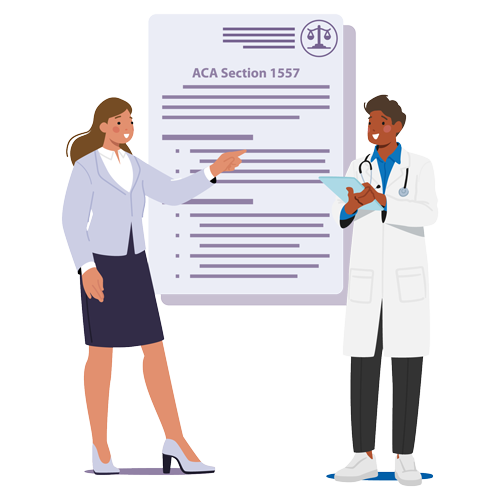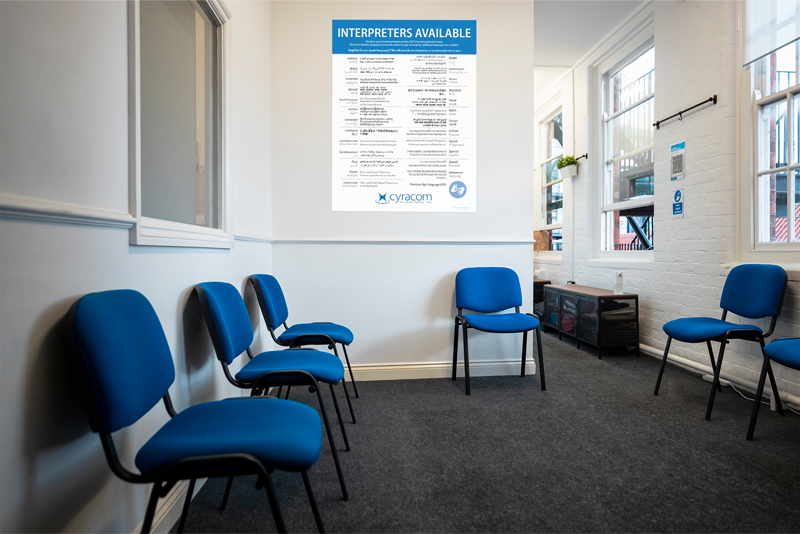Section 1557 still supports the use of qualified phone and video interpreters to help providers deliver timely language access to their LEP patients.
The material herein is educational and informational only. No legal advice is provided.


Section 1557 of the Affordable Care Act deals with nondiscrimination. A significant portion of HHS’s original rule focused on the care of limited-English proficient (LEP) patients, building on the precedent set by Title VI, which prohibits national origin discrimination and mandates language access in healthcare.
Since some of the details changed under HHS’ Final Rule, we compiled them here to help you through the Section 1557 requirements regarding language access.

2016 Rule:
ACA Section 1557 required providers to post a notice of nondiscrimination and taglines (short statements advising language services are available) in the state’s/hospital’s top 15 languages.
2020 Rule:
HHS repealed the requirement that covered entities must provide a nondiscrimination notice and tagline in all significant communications.
Changed:
It removes the broad, sometimes confusing, and inefficient requirement that all significant communications must contain taglines.
Same:
Prior statutes and regulations still mandate entities to provide a notice of nondiscrimination. Covered entities must continue to provide taglines (short statements advising language services are available) whenever such taglines are necessary to ensure meaningful access by LEP individuals to a covered program or activity.

How CyraCom Can Help
CyraCom provides a complimentary and customizable “Interpreters are available” poster that you can easily fill in with your top language translation needs.

How CyraCom Can Help
Need documentation that your bilingual staff is qualified? We offer assessments in over 45 languages.
2016 Rule:
Section 1557 requires qualified interpreters and prohibits the use of:
Proficient in speaking and understanding both spoken English and at least one other spoken language, including any necessary specialized vocabulary, terminology, and phraseology, and;
Is able to effectively, accurately, and impartially communicate directly with individuals with limited English proficiency in their primary languages.”
*Demonstrating these skills will likely require some form of interpreter training/certification
2020 Rule:
The 2020 Rule retains many of the 2016 Rule’s provisions related to interpreter access for LEP individuals.
Changed:
This Final Rule removes definitions of the terms “qualified bilingual/multilingual staff” and “individual with limited English proficiency.”
Same:
The 2019 NPRM (Notice of Proposed Rulemaking) expressed HHS’s commitment to interpreting those terms naturally and consistently with the 2016 Rule.
2016 Rule:
Section 1557 mandates that providers “take reasonable steps to provide meaningful access to each individual with limited English proficiency eligible to be served or likely to be encountered in its health programs and activities.” It also bans discrimination based on association, meaning providers must supply interpreters as needed to their patients’ families, spouses, or partners as needed.
2020 Rule:
The Rule maintains that entities are obligated to take reasonable steps to ensure meaningful access to covered health programs and activities for LEP individuals.
Changed:
HHS replaced the two-factor test with the Department of Justice’s 2003 LEP Guidance four-factor test, which assesses how an entity should provide meaningful access:
HHS also repealed the language that prohibits discrimination against an individual or entity on the basis of being known to or believed to have a relationship or association.
Same:
This Final Rule clarifies where language assistance services are required to be offered by a covered entity:

How CyraCom Can Help
CyraCom qualifies our employee interpreters with our extensive interpreter training course.

How CyraCom Can Help
We have been offering VRI since 2009 and now offer over 35 languages. Your staff can reach CyraCom’s phone and video interpretation services from many devices–including equipment your facility already has, such as laptops, tablets, or mobile phones.
2016 Rule:
Section 1557 supports the use of qualified phone and video interpreters to help providers deliver timely language access to their LEP patients – with the caveat that video interpretation must meet the quality standards set for ASL interpretation by the Americans with Disabilities Act:
2020 Rule:
This Rule permits remote English-language interpreting services to be audio-based rather than requiring them to be video-based.
Changed:
HHS removed the requirement for matching the quality standards set for ASL interpretation by the Americans with Disabilities Act.
Same:
Section 1557 still supports the use of qualified phone and video interpreters to help providers deliver timely language access to their LEP patients.
2016 Rule:
ACA Section 1557 grants LEP individuals a specific cause of action against healthcare providers that fail to “take reasonable steps to provide meaningful access.” This is a departure from Title VI of the Civil Rights Act (the previous law on language access), which allowed fines and Medicare/Medicaid cuts for non-compliant hospitals but did not enable individual patients to sue for discrimination. Staff should understand the potential consequences of non-compliance and be well-trained in accessing an interpreter quickly and efficiently.
2020 Rule:
HHS has repealed this, instead reverting enforcement as applied under Title VI, Title IX, the Age Act, or Section 504.
Changed:
HHS has concluded that its enforcement of Section 1557 should conform to the Department of Justice’s Title VI Manual. The manual states that, under applicable Federal case law, compensatory damages are generally unavailable for claims based solely on a Federal agency’s disparate impact regulations.
Read a lawyer’s analysis of Section 1557 litigation
Same:
HHS states that the prior regulations will provide for enforcement of Section 1557 in applicable circumstances in the same way.

How CyraCom Can Help
With over 25 years of experience, CyraCom’s language service experts have helped thousands of organizations execute their language access plans.
Contact us today so we can help you with yours.
The material herein is educational and informational only. No legal advice is provided.
About CyraCom
In business for over 30 years, CyraCom is a language services leader that provides interpretation and translation services to thousands of organizations across the US and worldwide.
Sales Inquiries
New Client Signup &
Current Client Support
CyraCom Careers
Corporate Office
2650 E Elvira Rd, Suite 132
Tucson, AZ 85756
Sign in to your account